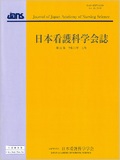Japanese
English
- 販売していません
- Abstract 文献概要
- 参考文献 Reference
要旨
目的:急性期内科系病棟に所属する勤務帯リーダーに必要とされるせん妄ケア実践能力を明らかにすること.
方法:急性期内科系病棟に勤務する勤務帯リーダーおよび看護管理者,急性期病院の専門看護師・認定看護師を対象に半構造化面接を行い,質的記述的に分析した.
結果:12名の研究対象者から,【せん妄の発症から今後の経過を見据えた包括的なアセスメント】,【せん妄ケアの担い手である勤務帯メンバーへの支援】,【せん妄の原因となる身体的変調の回避・緩和を目指した医師への交渉】,【せん妄の適切な薬物療法を目指した多職種のマネジメント】などの11の実践能力が抽出された.
結論:勤務帯リーダーに必要とされるせん妄ケア実践能力は,勤務帯において,高齢者に対する包括的かつ継続的なせん妄ケアを病棟で提供できるよう,勤務帯メンバーや看護管理者,多職種,家族との積極的な連携を通じて,せん妄ケアに最適な人的・物的環境を柔軟に創出していく行動と考えられた.
Purpose: To identify the delirium care competency of shift leader nurses at the acute medical wards.
Methods: Semi-structured interviews were conducted with nurses, shift leader nurses and nurse managers of the acute medical wards, and certified nurse specialists / certified nurses of acute care hospitals. Data were analyzed using a qualitative descriptive approach.
Results: As a result, 11 competencies were identified from 12 study participants: for example “Assessing patients comprehensively”; “Supporting working shift members”, “Consulting doctors to avoid and mitigate physical alterations”; “Managing toward proper medications.”
Conclusion: Delirium care competency of work shift leader nurses included providing comprehensive and continuous delirium care for the elderly. Such care can be provided in the ward during the work shift, through active collaboration with their member nurses, nursing managers, multiple disciplines, and families. Their competencies also included an action that flexibly creates the optimal human resource and physical environment toward delirium care.
Copyright © 2021, Japan Academy of Nursing Science. All rights reserved.


